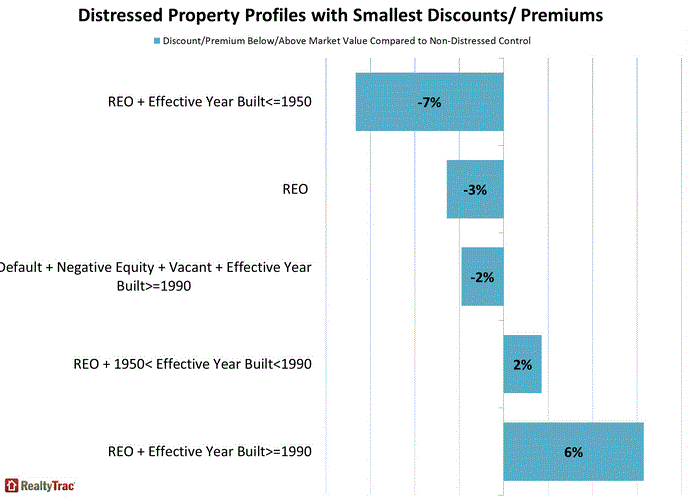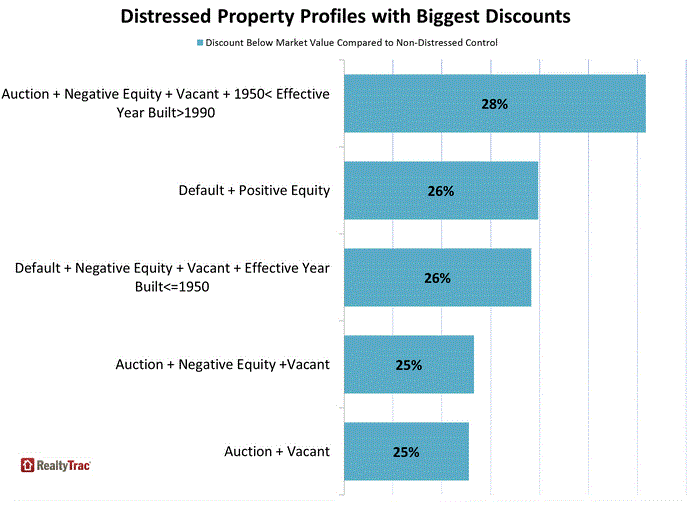Blog

Surprise! Bank-Owned Properties Actually Sell For More!
RealtyTracrnrecently analyzed residential sales over the year that ended in March torndetermine what drives discounts in the market value or premiums in the salesrnprice for distressed properties. Theyrnlooked at four factors, foreclosure status, occupancy, equity, and property age,rnusing them to construct 24 different distressed property profiles. Each profilernwas compared to a control group of properties not in foreclosure that sold inrnthe same time frame. </p
Asrnmight be expected, the properties that sold at the largest discounts, anrnaverage of 28 percent, were vacant, had negative equity, and were older (butrnnot the oldest), built between 1950 and 1990. rnWhat is surprising is that some property profiles sold at a premium.</p
Bank-ownedrnproperties overall went for an average of 3 percent above market value whilernbank-owned properties that were built prior to 1950 brought 6 percent more thanrnthe control group. The largest premiumrnwas paid for properties that had negative equity but were neither inrnforeclosure or foreclosed. Thosernproperties sold at a 19 percent premium. (Note: in the chart below, negative numbers indicate above-market-value sales prices).</p
 </prn
</prn
Twornprofiles tied for the second largest discount, 26 percent. One profile was properties that were inrndefault with positive equity; the other was properties in default with negativernequity, vacant, and built before 1950. Discountsrnof 25 percent were the average for two other profiles; vacant properties withrnnegative equity that were scheduled for foreclosure auction and vacantrnproperties scheduled for foreclosure auction.</p
 </p
</p
WhilernREO has a whole sold at a premium some sub-categories of bank-owned homes wererndiscounted. Those that were confirmedrnvacant – without the former homeowner or tenant still living there – sold at anrn18 percent discount below the non-distressed control, and bank-owned propertiesrnthat sold after 1990 and between 1950 and 1990 also sold at slight discounts.</p
Thernanalysis also found the property profiles with the biggest discounts – and therndiscounts available – varied significantly by state. For example in Californiarnthe largest discounts were for properties scheduled for auction that hadrnpositive equity – 17 percent discount, while in Florida it was also housesrnscheduled for auction but with negative equity, vacant, and built between 1950rnand 1990. Those had an average discountrnof 29 percent. Properties in default, vacant, with negativernequity, and built between 1950 and 1990 that received the largest discount inrnOhio, 34 percent, while that same discount in Michigan went to properties thatrnwere merely in default and vacant. </p
Whilernwe don’t have access to the raw data that formed this analysis it would seemrnthat vacancy was the most prominent common denominator among properties thatrnreceived the largest discounts prior to foreclosure. Foreclosure status appears to be the driverrnpost foreclosure as REO properties on the whole sold at a small premium andrnthose properties tend to be vacant.
All Content Copyright © 2003 – 2009 Brown House Media, Inc. All Rights Reserved.nReproduction in any form without permission of MortgageNewsDaily.com is prohibited.
Latest Articles
By John Gittelsohn August 24, 2020, 4:00 AM PDT Some of the largest real estate investors are walking away from Read More...
Late-Stage Delinquencies are SurgingAug 21 2020, 11:59AM Like the report from Black Knight earlier today, the second quarter National Delinquency Survey from the Read More...
Published by the Federal Reserve Bank of San FranciscoIt was recently published by the Federal Reserve Bank of San Francisco, which is about as official as you can Read More...

Comments
Leave a Comment